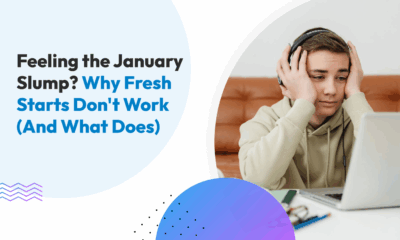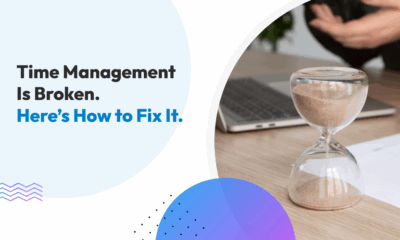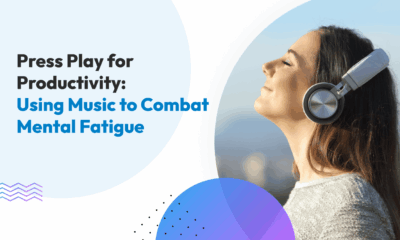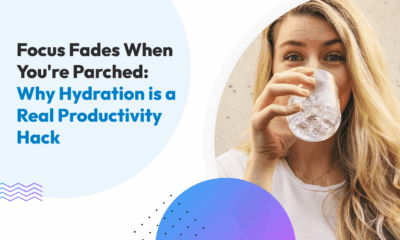Science Says
Struggling with Business Stress? Neuroscience Says You’re Timing Your Rewards Wrong
We often think of rewards as something to enjoy after accomplishing something challenging—watching a few episodes of a favorite show at the end of a busy week, a nice dinner after completing a project, or a dream vacation after hitting sales goals. Looking forward to the reward motivates and helps us unwind from the effort and stress of completing a task.
This study by Janine Dutcher presents another perspective—how about enjoying rewards first before tackling a tough task? She talks about how neurobiological processes in our brain’s reward system help regulate our stress response. Even better, this overlooked part of the brain helps build stress resilience, or coping with and adapting to stressors while minimizing negative mental and physical health effects.
So how do we harness our brain’s reward pathways to develop stress resilience? Read on for our key takeaways and actionable insights from this study.
The brain’s reward system can buffer the negative effects of stress
The brain’s reward system primarily involves a region in the center of the brain called the ventral striatum, which processes and responds to positive experiences. The front of our brain or the prefrontal cortex is also involved in controlling and regulating those responses to reward.
When activated, this system releases neurotransmitters like dopamine and opioids that make us feel good and lower physiological stress responses. Studies have shown that reward system activation can lower heart rate, blood pressure, and cortisol levels, while also reducing anxiety and improving performance under pressure.
This research suggests that engaging your reward system isn’t just about feeling good—it’s a powerful tool for managing stress at a biological level that also translates to performance. So, finding ways to activate your reward system helps with long-term health and could help you stay calm and focused, even in high-pressure situations.
Action Item: Tapping the brain reward systems can supplement what researchers call ‘top-down executive processes’ – problem-solving, planning, goal-directed behavior’ – which tend to be the first solutions we think of when it comes to dealing with stress. Try incorporating small, enjoyable activities throughout your workday, such as listening to your favorite music between tasks, taking short breaks to engage in a hobby you love, or celebrating small wins.

Rewards go beyond basic human needs
Neuroscience distinguishes between primary rewards (basic physiological needs necessary for survival like food and sex) and secondary rewards (experiences or goods we learn to be beneficial though not directly linked to survival). Secondary rewards including wealth, status, social acceptance, and positive self-reflection, can be particularly powerful for entrepreneurs or freelancers.
Research by Kirschbaum et al. (1995) showed that social support buffers cortisol stress responses. Dutcher et al. (2016) found that self-affirmation (reflecting on one’s values or strengths) not only activates neural reward circuitry but also enhances performance on a subsequent stressful math test.
For business owners, this means receiving positive feedback from clients, achieving a business milestone, or spending time thinking about your ‘why’ can all serve as powerful rewards that help buffer against stress.
Action Item: As you consider how to be more intentional about building reward enjoyment into your schedule, consider these secondary sources of positive feelings. Having and nurturing a support system and being your own cheerleader are scientifically recognized as protective against stress.
Enjoying a reward is a process
Researchers have identified three psychological components of reward: learning, liking, and wanting. Each involves different brain regions and neurochemicals. The learning component involves first encountering a positive experience and recognizing it as rewarding, the liking component is the enjoyment of the reward, and the wanting component is being motivated to seek the reward again.
These components can get disrupted in the brain. That’s why in conditions like addiction or depression, someone might seek a reward without necessarily enjoying it, or one can truly enjoy something but lack the motivation to pursue it.
Action Item: Recognizing these different facets of activating the brain reward system can help us create more effective reward systems for ourselves (and/or our teams). Try new experiences – they could introduce you to new activities or relationships that expand your list of rewarding experiences. Focus on what genuinely brings you pleasure, not just what you think should be rewarding.
Remember that seeking positive experiences is crucial for stress resilience too. So if you’ve been putting off a vacation or brushing off compliments because you’re too focused on work, maybe it’s time to check if you are making space to seek rewards and not ignoring or deprioritizing your desire for positive experiences.

Reward timing, what has been known to work?
Research on the brain’s reward system has typically designed experiments where subjects are first given a reward and then subjected to a stressful activity. Results suggest that enjoying something before a challenging task can blunt the adverse effects of stress.
It doesn’t just work with primary rewards (e.g. showing rewarding images to participants before a public speaking and mental math trial led to lower cortisol build up compared to a control group). In the study by Dutcher et al. (2016) earlier mentioned, self-affirmation before a problem-solving trial or mental math trial also showed physiological and performance-based advantages compared to participants under control conditions who didn’t enjoy rewards before the stress testing.
There is even an indication that “pre-rewarding” helps those struggling with chronic stress. In this study, undergraduate students with self-reported chronic high stress showed better performance when given self-affirmation exercises prior to a problem-solving and creativity test under pressure.
Action Plan: This “pre-rewarding” strategy could be particularly useful for entrepreneurs facing high-intensity situations and managing chronic stress. Next time you are gearing up to do something you don’t particularly enjoy, what about engaging in a positive experience beforehand to help deal with the stress of the dreaded task?
This could be enjoying your favorite coffee before an important presentation, spending a few minutes on a hobby before a difficult client call, reviewing a list of your recent accomplishments before a high-stakes negotiation, or catching up with friends before dealing with some administrative work you don’t particularly look forward to.
Is your brain primed to enjoy rewards?
Research has shown that we all differ in terms of how sensitive our brain reward systems are to positive experiences. Individuals whose brain MRIs show higher activity in the ventral striatum while receiving rewards (higher reward sensitivity) tend to have better stress coping and mental health outcomes.
Nikolova et al. (2012) found that young adults with higher ventral striatum reactivity to rewards showed more positive emotional states in the face of recent life stress. In another study on adults following traumatic experiences, Ben-Zion et al. (2022) demonstrated that higher reward sensitivity predicted lower PTSD symptoms in the long term.
That is why several interventions for those struggling with mental health concerns have been designed specifically to enhance reward sensitivity. An example is Behavioral Activation (BA) Therapy, where you are encouraged to schedule more positive, rewarding activities and find more opportunities to pursue self-identified goals. Deep brain stimulation of the reward-related brain regions and a combination of mindfulness training and cognitive behavioral therapy have been found to have positive effects, as well.
Action Item: While we can’t directly measure our brain’s reward reactivity, we can take steps to enhance our overall sensitivity to rewards. In addition to regularly engaging in activities you enjoy, even if they’re not directly work-related, you can incorporate practicing mindfulness and gratitude journaling to increase your awareness and appreciation of positive experiences.
Limitations of the Research
While the science behind the brain’s reward system and stress resilience offers promising insights, it’s important to understand the current state of research to best apply these findings:
The studies show clear evidence that reward system activation can buffer against stress, but much of this research has been conducted in controlled laboratory settings. Real-world stress, especially in business environments, often involves complex, interacting factors that may influence how effectively reward-based strategies work.
Individual differences also play an important role. The study shows that people’s sensitivity to rewards can vary significantly – what effectively activates one person’s reward system might not work as well for another. This suggests the value of experimenting with different types of rewards and timing to find what works best for you.
While we know that rewards can help reduce stress in the short term, research is still ongoing about the long-term effects of reward-based interventions on stress resilience. This presents an opportunity to be mindful about incorporating these strategies consistently over time while staying attuned to their effectiveness.
Lastly, there’s a potential downside to focusing too much on rewards and the wrong rewards – for example using food can lead to unhealthy outcomes, or taking breaks between tasks might reinforce avoidant behavior or procrastination. So we must take care that the rewards we incorporate in our daily activities should lead to healthy habits.
Wrap Up
Rather than thinking of reward as something we need to earn or deserve, this study reminds us that positive experiences are essential for us to thrive both physically and mentally. Activation of the reward systems in the brain, before diving into a difficult task, has a protective effect versus stress on our bodies and our minds and can even improve performance. So instead of delaying or ignoring opportunities to enjoy, treat them as important activities to include on your daily, weekly, and even annual must-do list.
Many effective rewards – like connecting with supportive peers, reflecting on your primary values and strengths, or engaging in meaningful activities – don’t even require significant time or financial investment. By intentionally incorporating these rewarding experiences, especially before challenging tasks, we can build better stress resilience and maintain both performance and health in the face of daily pressures.












